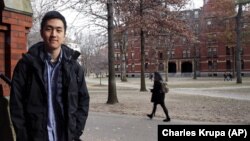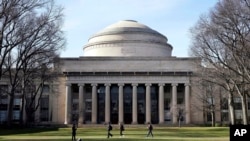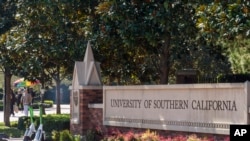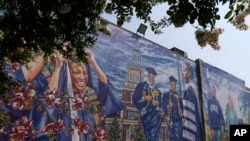Student Union
Immigration Policy Could Kill Dreamer's Rhodes Award
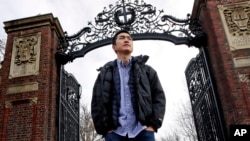
Harvard University graduate Jin Park didn't just earn an esteemed Rhodes scholarship to study at the University of Oxford in England with all expenses paid.
He's the first "Dreamer" — or non-citizen undocumented U.S. resident -— to be selected for the vaunted honor. Famous Americans who shared that honor include President Bill Clinton, Senators Cory Booker and Bill Bradley, journalist Rachel Maddow and former U.S. Ambassador to the U.N. Susan Rice.
The scholarship was created in 1902 by British businessmen and politician Cecil Rhodes. It pays all costs for at least two years of study at Oxford. Since Park is technically not an American, and he said he fears not being allowed back in the U.S. if he leaves for England.
Dreamers were children brought to the U.S. illegally, who came to the U.S. without documents, or who came legally but their legal status expired. Park, 22, came to the U.S. with his parents from South Korea when he was 7.
In 2012, former President Barack Obama gave Dreamers protected status to stay in the U.S., where they had grown up, under a policy called Deferred Action for Childhood Arrivals (DACA). To be eligible for DACA protection, immigrants must have entered the country by 2007 and been younger than 16 when they arrived.
Park is a DACA recipient, which means he receives a renewable two-year period of deferred action from deportation.
DACA beneficiaries could travel in and out of the U.S. if they were granted advance parole, allowing them to leave the country and return for purposes such as studying abroad.
But in September 2017, President Donald Trump announced his administration would phase out DACA, and discontinued the travel abroad option. Some states challenged that decision in federal court which have upheld the DACA policy. The Trump administration is seeking a Supreme Court review of those decisions.
Should I stay or should I go?
Nearly 700,000 DACA individuals remain in legal limbo in the contentious American discussion about immigration. Among them is Pack, who says the excitement of being selected for the Rhodes scholarship has been replaced with feelings of uneasiness.
"If I leave, there's a very real possibility that I won't be able to come back. That's the biggest fear for sure," said Park.
Park told the Associated Press he has had a difficult time talking to his parents about the risks of accepting the Rhodes scholarship. They cried out in happiness when news of the award came.
“I’ve been avoiding that question,” he said days after finishing his studies at Harvard. “This was especially meaningful for them. It was like a validation of the sacrifices they’ve made for me.”
Rhodes' hands tied
Elliot Gerson, the American secretary for the Rhodes organization, said the issue is a "matter of American law and not anything the Rhodes Trust can resolve alone.
"Our hope is for federal action," he added.
Kristian Ramos, a representative for immigrant support organization Define American, said the government should enforce the law as it stands and let Park study in England.
Park said he wants to remain a voice in the immigration debate and thinks the value of going to Oxford is greater than the risks.
"I'm looking forward to having that unstructured time to think about these broader questions of who belongs in America and the value judgments we make about others," he said.
Park has been a voice for DACA recipients since he was in high school. In 2015, he founded Higher Dreams, a nonprofit group that helps students without permanent immigration status gain admission to college.
With the help of Harvard, Park competed for the Rhodes scholarship last year, partly to show how this and other awards ignore DACA recipients.

The story of Park’s application
Park's first Rhodes application was rejected. When the organization changed its policy last year, Park re-applied and was selected.
Gerson said the change shows the organization's efforts to expand who can apply. Legal permanent residents and residents of U.S. territories like Puerto Rico have also been permitted to apply in recent years.
At Oxford, Park said he hopes to study migration and political theory, but the molecular and cell biology major has also applied to medical school. But he is also open to possibly working in city government, where he could help change immigration policy "no matter who is in the White House," he said.
Regardless, Park said New York City is home.
"For me, I think of Queens, New York," he said. "Whatever happens, I'm always going to know that fact. Even if I have to spend the rest of my life convincing the administration, or whoever comes next."
U.S. Citizen and Immigration Services, which oversees DACA, did not answer Associated Press emails seeking comment.
Please share your thoughts in the Comments here, and visit us on Facebook, Twitter, Instagram and LinkedIn.
See all News Updates of the Day
US remains top choice for Indian students going abroad

About 69% of Indian students traveling abroad for their studies chose the United States, according to a Oxford International’s Student Global Mobility Index. Other popular choices were the United Kingdom, Canada and Australia.
Education Times reports the main influencers for deciding where to study abroad – for Indian students and others – were parents. (April 2024)
Malaysian official: Schools can’t turn away from global tensions

Zambry Abdul Kadir, Malaysia’s higher education minister, said protests spreading across universities in the United States show that schools can’t ignore political tensions.
Helen Packer, reporting in Times Higher Education, said the minister reminded educators that universities are key in the development of leaders, individuals and societies. (April 2024)
Social media breaks are difficult, but necessary

Between online classes, maintaining social connections and working on projects, college students can have a hard time disengaging from the demands of technology.
In Florida International University’s PantherNOW, Ariana Rodriguez offers strategies for taking a break from social media. (April 2024)
- By Melos Ambaye
Many master's degrees aren't worth the investment, research shows
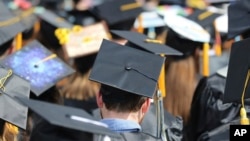
Nearly half of master's degrees have a negative financial return, according to new research by the Foundation for Research on Equal Opportunity, an economic research organization.
The study indicates that many graduate degree programs do not increase lifetime earnings enough to be worth it.
While 23% of bachelor’s degree programs yield a negative financial return on investment, 43% of two-year degrees and master’s degrees fail to deliver a return, according to the study by Preston Cooper, a senior fellow at FREOPP.
Cooper assessed the return on investment for 53,000 degree and certificate programs to determine whether a student’s lifetime earnings outweigh program costs and the risk of not completing their degree.
His findings show that a student’s field of study was the overriding indicator of return on investment at the undergraduate and graduate level.
Engineering, computer science and nursing bachelor’s degrees have high financial returns on investment, while programs in education, fine arts, psychology and English usually have low returns.
Graduate degrees in medicine and law tend to have strong payoffs. But a large share of master’s programs, including the MBA, frequently have low payoffs, according to Cooper.
Although workers with master’s degrees earn 16% more than those with only bachelor’s degrees, Cooper says the figure fails to account for students who had “higher preexisting earnings potential.”
“MBA students typically have high preexisting earnings potential, having often chosen high-ROI undergraduate majors such as finance and economics,” Cooper writes. “So the MBA adds little value on top of that.”
The study indicates that high starting salaries are predictors of high returns on investment. Degrees with starting salaries of $57,000 a year or more deliver the best lifetime returns.
But the return on investment of a degree can vary depending on the educational institution.
“Students interested in fields with low average pay can still find some schools that do well transforming those fields of study into high-paying careers,” Cooper writes.
The quality of an institution also matters, said William Tierney, professor emeritus of higher education at the University of Southern California.
“An MBA from Harvard is a likely ticket to a good job,” Tierney told VOA. “An MBA from the University of Phoenix, less so.”
But students pursue graduate programs for more than just financial reasons.
“Some degrees open up careers in fields that students may enjoy, such as in the performing arts,” Robert Kelchen, head of educational leadership at the University of Tennessee, Knoxville, told VOA.
“Others can help gain access to social networks or simply help students learn about a topic that is of interest,” Kelchen added.
Cooper told VOA that it might make sense for students in degree programs with low returns on investment to switch majors if they can still graduate on time.
He found the worst outcome for a student’s return on investment is dropping out of college “because they must pay for one or more years’ tuition and spend time out of the labor force.”
Lawmakers who fund higher education have a responsibility in ensuring “higher education delivers on its promise of economic mobility,” Cooper said.
Nearly a third of federal funding, including Pell grants and student loans, pays for higher education programs that fail to provide students with a return on investment, according to the study.
Cooper’s view is that “some schools should shut down low-ROI programs and reallocate institutional resources to programs with a better return.”
“There's definitely this narrative out there that higher education is always worth it, and you should always try to get that extra degree because it will increase your earnings,” he told VOA. “That's reinforced by colleges who make lofty promises regarding their graduate degree programs' outcomes, which all too often fall short.”
Harvard students end protest as school agrees to discuss Gaza conflict
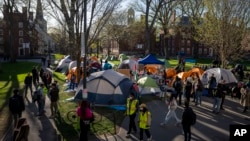
Protesters against the war between Israel and Hamas were voluntarily taking down their tents in Harvard Yard on Tuesday after university officials agreed to discuss their questions about the endowment, bringing a peaceful end to the kinds of demonstrations that were broken up by police on other campuses.
The student protest group Harvard Out of Occupied Palestine said in a statement that the encampment "outlasted its utility with respect to our demands." Meanwhile, Harvard University interim President Alan Garber agreed to pursue a meeting between protesters and university officials regarding the students' questions.
Students at many college campuses this spring set up similar encampments, calling for their schools to cut ties with Israel and businesses that support it.
The Israel-Hamas war began when Hamas and other militants stormed into southern Israel on October 7, killing some 1,200 people and taking 250 hostages. Palestinian militants still hold about 100 captives, and Israel's military has killed more than 35,000 people in Gaza, according to Gaza's Health Ministry, which doesn't distinguish between civilians and combatants.
Harvard said its president and the dean of the Faculty of Arts and Sciences, Hopi Hoekstra, will meet with the protesters to discuss the conflict in the Middle East.
The protesters said they worked out an agreement to meet with university officials, including the Harvard Management Company, which oversees the world's largest academic endowment, valued at about $50 billion.
The protesters' statement said the students will set an agenda that includes discussions on disclosure, divestment, reinvestment and the creation of a Center for Palestine Studies. The students also said that Harvard has offered to retract suspensions of more than 20 students and student workers and back down on disciplinary measures faced by 60 more.
"Since its establishment three weeks ago, the encampment has both broadened and deepened Palestine solidarity organizing on campus," a spokesperson for the protesters said. "It has moved the needle on disclosure and divestment at Harvard."




